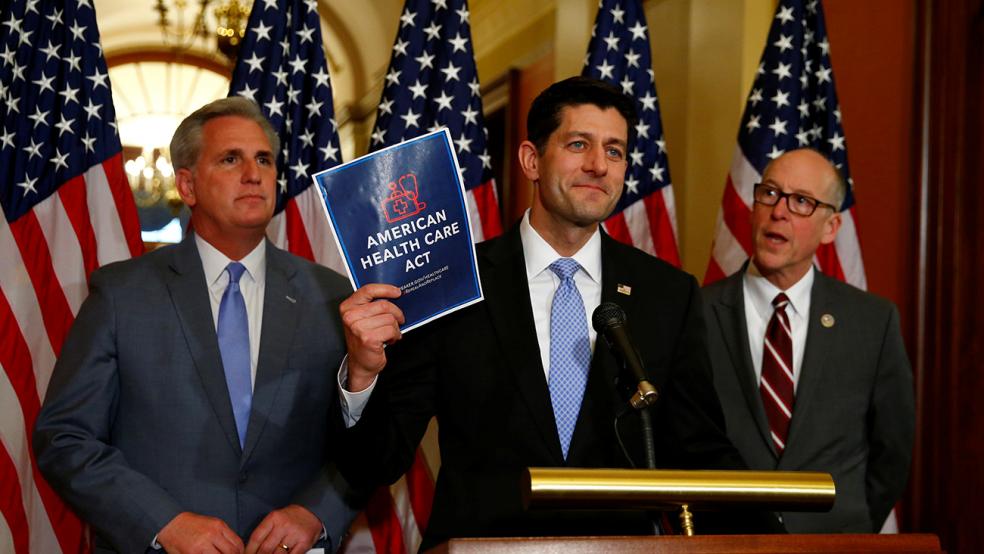Maybe it’s sleep deprivation due to all-night committee meetings spent contemplating the American Health Care Act, or maybe it’s just simple giddiness at the prospect of feeling as though they are at long last on the cusp of repealing and replacing the Affordable Care Act. Whatever the explanation, over the last few days a lot of Republicans have made comments about medical care, the American poor and basic concepts like, well, health insurance that have given critics reason to question whether their reform effort is really meant to deliver higher quality, lower cost health care to the American people.
Take House Speaker Paul Ryan, the man who rose to prominence in the GOP by dint of his supposed mastery of policy arcana. In a presentation to reporters on Thursday, he walked them through what he described as the “fatal conceit” of the Affordable Care Act: Healthy people buying insurance who turn out not to need care in the near term are “subsidizing” sicker people, who do need care.
Related: 3 Big Winners in the GOP Health Care Plan – and 3 Big Losers
That, as more than a few people quickly pointed out on social media and in the mainstream press, is pretty much how insurance is supposed to work. (And particularly in the U.S., where life expectancies are relatively long, it pays to remember that the vast majority of younger, healthier people subsidizing older, sicker people will one day be older and sicker themselves.) If Ryan is opposed to the healthy subsidizing the sick, does he really believe in properly functioning health insurance at all?
But Ryan was far from the only Republican to raise some eyebrows over the past week. Rep. Jason Chaffetz of Utah, the chair of the House Oversight and Investigations Committee, suggested in an interview that poor Americans worried about losing health care if the Affordable Care Act is replaced with a less generous plan might just be a little too profligate in their non-healthcare spending.
“Americans have choices, and they’ve got to make a choice,” he said on CNN. “So rather than getting that new iPhone that they just love and want to go spend hundreds of dollars on that, maybe they should invest in their own health care.”
For most Americans, of course, a new iPhone is something they might buy every few years, and typically at the cost of less than a month’s worth of insurance premiums. After Chaffetz’s appearance on CNN, the woman planning to run against him in 2018 reported a huge spike in donations to her campaign.
Related: Is the Republican Health Care Bill Headed for a Do-Over?
Then, there’s Florida Rep. Mike DeSantis, who said in an interview that cancer patients who lose coverage under ACHA need not worry, because they can go to the emergency room.
On CNN, DeSantis was asked about the case of a young woman who self-identified as a Republican. She said that she suffers from cancer and that she would lose access to treatment without the ACA’s expanded access to Medicaid.
“Well, if you remember when Obamacare was enacted, there were millions of people who had their health care canceled,” DeSantis said. “And so there are stories of people who had certain needs, cancer or whatnot, who got pushed into policies that they didn’t want, and then they didn’t have the same coverage that they had because of the broken promise ... I would say though, and people who supported Obamacare used to make this point a lot before it passed, there really is no lack of health care. If people really need it, they show up to the emergency room, they do get care, it just gets passed on to other folks.”
Once again, the very idea of health insurance and the need for proper medical care seems to be in question here.
Related: The GOP Health Plan: A Giant Step in the Wrong Direction or Merely Step One?
Then there was Illinois Rep. John Shimkus, who seemed to temporarily forget some fundamental facts about how babies are made. During a mark-up of the GOP’s proposed ACA replacement bill, Shimkus was complaining about the current law’s mandates when he was interrupted by Pennsylvania Democrat Michael Doyle.
Doyle: What mandate in the Obamacare bill does he take issue with? Certainly not with pre-existing conditions, or caps on benefits or letting your child stay on the policy until 26, so I’m curious what is it we’re mandating?
Shimkus: What about men having to purchase prenatal care? Is that not correct? And should they?
Doyle: There’s no such thing as a la carte insurance, John.
Shimkus: That’s the point. We want the consumer to be able to go to the insurance market and be able to negotiate on a plan.
Doyle: There’s not a single insurance company in the world that does that. You’re talking about something that doesn’t exist.
Online, people relentlessly reminded Shimkus of just why women need pre-natal care, and the mechanics of how they get to that point. More broadly, Shimkus was reminded that insurance works for everyone who has a policy, whether they need a particular service or not.
But perhaps the oddest and most disturbing comment came last week, from Rep. Roger Marshall of Kansas, who is himself a doctor.
Related: Obamacare Repeal Won’t Be Cheap: GOP Plan Could Cost $700 Billion
“Just like Jesus said, ‘The poor will always be with us,’” he told the medical website Stat. “There is a group of people that just don’t want health care and aren’t going to take care of themselves.”
“Just, like, homeless people … I think just morally, spiritually, socially, [some people] just don’t want health care,” he said. “The Medicaid population, which is [on] a free credit card, as a group, do probably the least preventive medicine and taking care of themselves and eating healthy and exercising. And I’m not judging, I’m just saying socially that’s where they are.”





